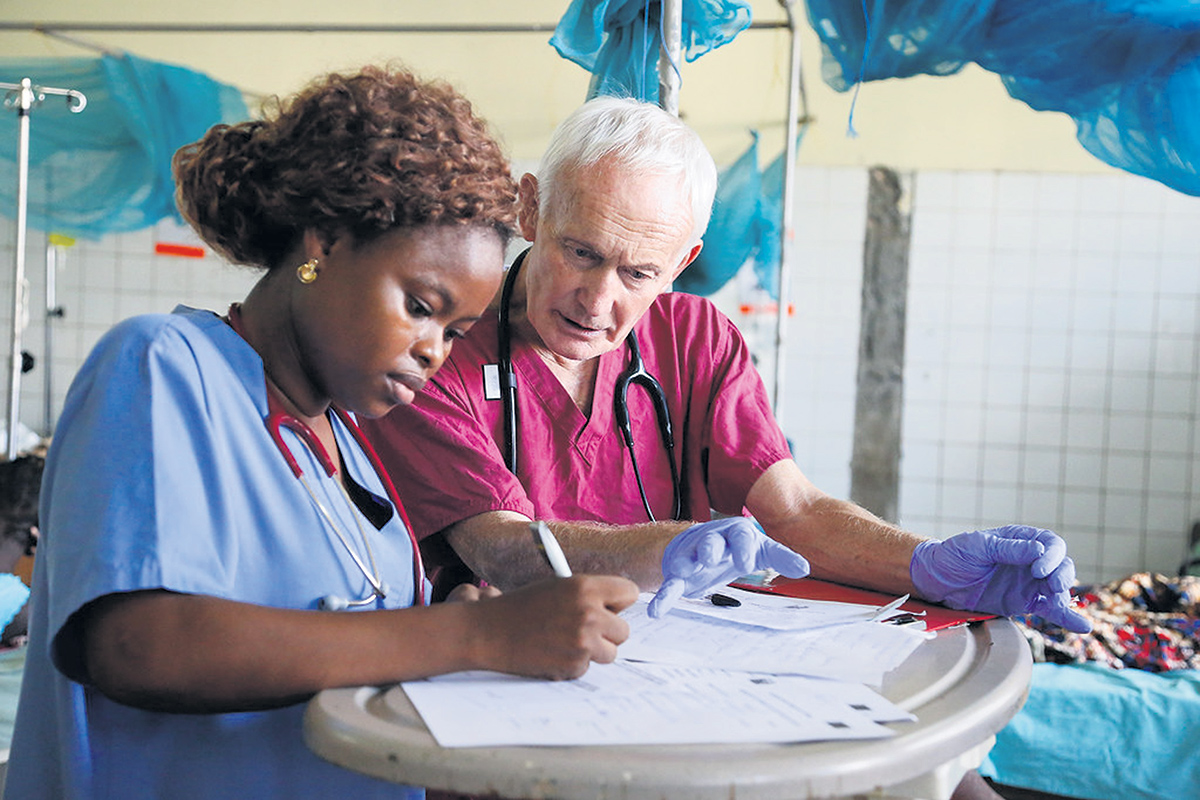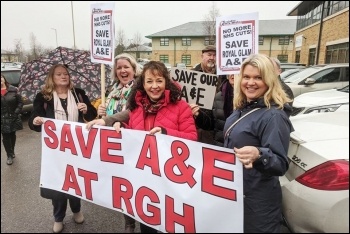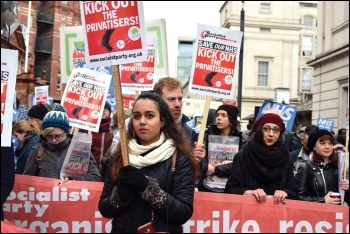No going back
A socialist NHS fit for heroes
Covid-19 has made the NHS more popular than for two generations. Millions of homes display window messages thanking the NHS and key workers, and most streets have held weekly claps. But the pandemic has also exposed the weaknesses and fragilty of the NHS. In the first of our ‘No going back’ series, on the 72nd anniversary of the foundation of the NHS, Jon Dale looks at health and the NHS in the light of the coronavirus crisis, and what kind of NHS we should be fighting for the post pandemic world.
The past few months have felt like war – normal life shut down; daily Covid-19 casualty reports; widespread anxiety, insecurity and hardship; frontline workers cheered for their heroic efforts.
Covid-19 has followed class lines, despite Johnson’s own experience. Male labourers are four times more likely to die from Covid-19 than professional workers. Black, Asian and Minority Ethnic people account for 11% of those admitted to hospital with Covid-19, but 36% of those admitted to critical care. A higher proportion in frontline jobs, less space at home, more health problems, and racist discrimination, contribute to this inequality.
Workers making vital contributions to all our lives are treated shamefully while bosses living off others’ hard work want for nothing. There is a growing feeling that things must change – returning to pre-Covid-19 inequality is unacceptable.
Cuts and underfunding
Privatisation and underfunding left the NHS in a weak state to face Covid-19. Far from being “fantastic” – Boris Johnson’s foolish boast as the onslaught began – 100,000 health workers’ positions were unfilled.
2018-19 was the worst winter for the NHS on record. One-third of hospital trusts hit 100% bed occupancy. A severe winter would have made that even worse. Britain has fewer hospital beds per head of population than almost every other wealthy nation. 17,000 beds were cut from the 144,000 available in 2010.
Recruitment and retention of staff became harder with high student fees, abolished bursaries, a 7.4% real pay cut since 2010, continual reorganisation, and bullying management demands to achieve impossible (often senseless) targets.
Half of student midwives surveyed in 2019 were considering leaving their course, due to average debt of £41,000 on graduation, and needing £562 a month from family and friends towards basic living costs.
In England alone, the NHS will need an extra 64,000 hospital doctors and 171,000 nurses over the next fifteen years, as part of 3.2 % annual overall workforce growth, according to an Institute of Fiscal Studies/ Health Foundation 2018 estimate.
During the pandemic we have clearly seen how the NHS and care services are run on minimal pay, and staff goodwill. It’s a disgrace that many NHS-employed workers’ basic pay is only £9.21 an hour. Outsourced and privatised workers are often on £8.72 an hour minimum wage (even less if they are under 25 years old). Trade unions should demand an immediate 10% pay rise and a minimum wage of £12 an hour, or £15 in London.
Millions have had their health care postponed as hospitals have become Covid-19 crisis centres. Waiting lists had already been growing by 7.7% a year since 2013.
Many Covid-19 survivors of severe illness could suffer long-lasting effects. New rehabilitation services are needed. Urgent measures are needed to make up lost ground before more irreparable damage is done.
The government has boasted about the Nightingale hospitals being built and equipped in a matter of days. Similar emergency measures must be taken to ensure that treatment is available for non-Covid related illnesses for all who need it, including during any possible future waves of the virus.
Private hospitals have been paid around £250 million since the start of the crisis to rent their 8,000 beds to the NHS, but they have hardly been used. They could not function without NHS-trained staff, NHS intensive care units and the NHS treating the patients with complex conditions they reject. They should be immediately nationalised, integrated into the NHS, and used to bring down waiting lists.
Privatisation
Privatisation, outsourcing and fragmentation of the NHS contributed to the deadly PPE scandal and the inability to adequately respond to the pandemic.
The establishment of the NHS meant that the provision of health services was largely blocked to the capitalists as a source of making money. From the mid-1970s there have been discussions on privatisation plans within the Tory party. The idea was fostered that the NHS was ‘unsustainable’, with demand for new treatments growing faster than the economy could afford.
An ‘internal market’ was introduced in 1991 by Tory health secretary Ken Clarke, allowing private companies to get their feet in the door.
New Labour swept to power under Tony Blair in 1997, pledged to scrap this internal market and replace competition with collaboration. Instead, they soon scrapped these policies, accelerating capitalist competition.
Private Finance Initiatives were used to build new hospitals, saddling the NHS with debts now worth £80 billion. Private companies were given contracts to provide both clinical and support services. During the pandemic the Tories wrote off the debts of the NHS trusts to the government. The same should now happen with all PFI debts.
New Labour copied right-wing Tory MP Nicholas Ridley’s 1977 privatisation plan: “We should fragment the industries as far as possible and set up the units as separate profit centres.”
A 2010 report estimated management and administration cost 14% of total NHS spending – doubled since 1990. Privatisation’s total bill is hard to measure, but probably adds at least £9 billion a year to the NHS budget.
The ConDem coalition government’s 2012 Health and Social Care Act brought new havoc. In partial recognition of this, Integrated Care Systems have been taking over purchasing and provision of NHS services in England since 2017. These decide who gets which services which are free, and which get charged for.
Andrew Taylor, director of the Co-operation and Competition Panel for NHS Funded Services, told a Commons committee in May 2019: “I don’t think anyone’s realistically talking about removing the private sector from the NHS. What the proposals do in effect is deregulate NHS markets. They don’t actually remove markets from the NHS.”
Tories
The Tories have taken advantage of the Covid-19 pandemic to spread the tentacles of private profiteers like Serco and Deloitte even further into the NHS. Huge sums of public money have been given to big business for Covid-19 PPE procurement and distribution, Nightingale hospitals, extra capacity in private hospitals, testing and contact tracing.
Each has been a failure, with no coordination with (underfunded) local public services. All these services should be publicly funded and democratically run so that care can be adequately planned.
The medical supplies industry must also be taken out of the hands of big business and integrated with the NHS. Many now threatened by unemployment could have alternative work making PPE or medical equipment.
The urgent need for new viral diagnostic tests, treatments and vaccines also shows the failure of profit-driven pharmaceutical companies to invest in infectious diseases. The industry needs nationalising, using the skills of scientists, pharmacists, doctors and engineers, combined with democratic workers’ control to produce for need, not profit. International cooperation is also vital.
Because of the experience of Covid-19 the Tories will be wary of directly cutting funding to the NHS in the immediate period. But neither the Tories nor a Keir Starmer-led Labour Party, which is also wedded to the capitalist system, can guarantee a fully funded NHS that meets the needs of all. Health cannot be separated from the inequality and poverty that are the inevitable consequences of a capitalist system in crisis.
Covid-19 has shown workers need a political party and trade union leaders fighting for a socialist NHS as part of a socialist reorganisation of society. Much ill health caused by capitalism could then be prevented. This sick system must go!
Mental health
Covid-19 and the lockdown have increased anxiety, loneliness, alcohol consumption and domestic abuse. Many health and social care workers are experiencing stress, and even PTSD symptoms, as a consequence of working on the front line during the crisis.
Unemployment will further worsen mental health. Preventing this needs a society prioritising solidarity over competition.
The NHS has never adequately dealt with mental illness. Victorian asylums eventually closed, supposedly replaced by care in the community. This would have been good if community mental health services, housing and other services met needs – but they didn’t. Insufficient funding, then brutal cuts, resulted in big increases in homelessness, addiction and other problems.
After traditional industries were closed and public services cut in the 1980s, support networks in working-class communities fragmented. Increasing pressures at school, university, work (including PTSD among ex-armed forces) and financial pressures have all contributed to worsening mental health.
The NHS had only 18,179 mental health beds in 2019, paying £1.8 billion for a further 8,942 private beds. US corporations like the Priory Group now run more than one in eight mental health beds.
In 2016, Priory was taken over by Acadia Healthcare from another US corporation, Advent International (which owned Poundland until 2010). Acadia paid £80 million interest over the next two years on the money it borrowed to buy Priory. However, it took £170 million interest from Priory on money it lent it.
Lending money from parent companies to subsidiaries at high interest rates, registration in tax havens, and similar dodges, suck huge sums from the NHS, its staff and patients.
Meanwhile, desperately ill patients get shunted across the country because there are too few beds. Private mental hospitals should be nationalised and integrated with the NHS, without compensating wealthy shareholders.
Mental illness needs a big increase in local hospital beds so patients are not isolated from their families and friends. There needs to be a massive increase in public funding of community mental health services, access to talking therapies (not limited to just a few sessions as now), art therapy, eating disorder and addiction services, which are essential to help people regain and maintain good health. Medication can be helpful, but if a substitute for the lack of other services, benefits pharmaceutical company profits – not patients.
Youth services, sports and leisure facilities, community centres and libraries holding free events, arts, music and drama, all help boost mental wellbeing, but have been decimated by local councils implementing Tory government cuts. Local authorities must be fully funded by central government to ensure that these vital services can be restored and extended.
The NHS needs a complete reorganisation of the way in which mental health services are delivered. Health workers, patients and the wider community should democratically decide how needs are met.
Care of the elderly
Pressure to increase patient numbers while cutting costs meant shorter hospital stays and production-line intensity. No one wants to stay in hospital longer than necessary, but the speed patients are discharged is often due to bed shortages. Hospital infections like MRSA have spread after insufficient time to thoroughly clean between patients.
Bed shortages have been worsened by social care cuts and privatisation. Frail elderly people become stranded in hospital when they don’t need further acute medical care, can’t manage at home, and need rehabilitation.
One-third of all community hospitals in England have had beds closed over the past ten years. Promised community care replacements either never materialised or suffered cuts.
Many new small community hospitals are needed – less disorienting than big busy general hospitals and easier for family and friends to visit.
Big corporations moved into social care expecting to make handsome profits, but severe council cuts have left them short. They are making workers and service users pay for cuts instead of taking the hit themselves.
Covid-19 has tragically further exposed this. The government ordered hospitals to send patients back to care homes, without first testing them for the virus. Many employers failed to provide adequate PPE. Tens of thousands of preventable deaths resulted.
Social care must be renationalised, democratically controlled, and local authorities given enough money to provide high quality home and residential care. Care workers need good training, secure employment and decent pay.
Prevention
Underlying health problems have increased the likelihood of suffering serious effects or dying from Covid-19.
Health care has dramatically and continually changed since the NHS was founded. Antibiotics cured many infections, while vaccines prevented others. Childhood deaths and disability – once common from measles, tonsillitis, polio and other infections – became very rare.
Life expectancy increased until the past decade of austerity and falling living standards. It has now shortened for the poorest 10% of women. The gap between the poorest and wealthiest 20% of local authority areas widened to 8.4 years for males and 5.8 years for females.
A baby born in the wealthiest areas is likely to have 18 more years of healthy life than a baby in the poorest areas.
Changes in work, play and travel reduced exercise for many. With dietary changes, especially processed foods heavily promoted by big business, obesity and its associated health problems became more common.
Abolishing poverty would greatly improve health. Warm, well-insulated housing with an end to overcrowding would make a big difference.
Many work long hours in boring or stressful conditions. Takeaway or processed food is quick and convenient, especially after long hours at work. A shorter working week would allow more time for planning and cooking meals, and for exercise.
Access to good fresh food, with time and facilities to cook, and cheap local community cafes serving healthy food, would help prevent many health problems.
At the same time, cuts to local authority and school leisure and exercise facilities must be reversed.
Massive agribusiness and food production companies, supermarkets and catering companies should be nationalised, and run under democratic workers’ control, so food can be healthy, cheap and pleasurable instead of profit-geared. The environment would benefit too.
The lockdown has shown the importance of access to fresh air and places to exercise – and how unequal this access is across society. It has also shown that air and water pollution is reversible. A socialist plan would stop capitalism poisoning the environment that damages health so widely.
History
During World War Two a powerful ‘No return to the 1930s’ mood developed. In factories, mines and the armed forces workers grew in determination that, having defeated the threat of fascism, they would then finish the job back home. Mass unemployment, the humiliation of means-tested benefits, illness and squalor endured by so many would be banished.
Chaotic and bankrupt health services – on the verge of collapse before 1939 – couldn’t cope with mass casualties during the war. The state had to step in where private health care and cash-starved local authorities failed.
As World War Two dragged on, more capitalists realised the working class would not be satisfied with hollow promises of “a land fit for heroes”. Those were made after World War One but never materialised. To encourage the war effort and head off the threat of revolution, plans were drawn up for a welfare state, including a national health service.
Labour won a huge majority in 1945 to deliver these plans – the biggest reforms ever won by the working class. The NHS was launched on July 5th 1948, giving free access to medical care to all. But the capitalist structure of society was left unchanged.
Big business bided its time but then started clawing back what it had been forced to give. 25 years of increasing privatisation of the NHS by Tory, New Labour and ConDem governments began in 1985, followed by the past decade of savage NHS and public service cuts.
A socialist programme for the NHS
- A fully publicly funded NHS free at the point of use. Scrap prescription, dental and all health charges
- Reverse all privatisations. Scrap the Private Finance Initiative and cancel all PFI debts
- Nationalise the private health care sector, the medical supply industry and the pharmaceutical companies – integrate them into the NHS
- An immediate 10% pay rise for all NHS staff. Minimum wage of £12 an hour – £15 in London
- Reinstate student bursaries and scrap tuition fees
- An NHS democratically run by elected and accountable committees including service workers and users
- A socialist planned economy to end poverty and inequality













